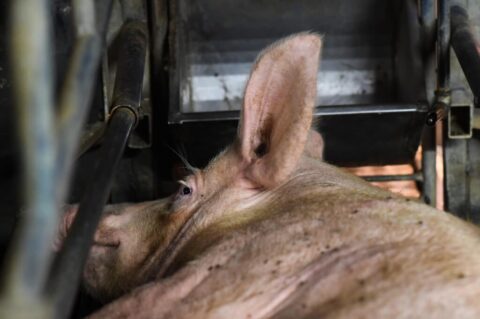Investigation
Meat Processing Plant Complaint Highlights Supply Chain Disruptions — And How the Meat Industry Isn’t Prepared
Food•4 min read
Perspective
Factory farms need to hear from you through petitions, letters from student governments, and calls to your representatives in Congress. And they need to hear from you because the end of animal farming is near.

Perspective • Food • Industry

Words by Matthew Zampa
Jo-Anne McArthur/We Animals
There are more farm animals than people in Iowa’s 4th Congressional District, represented by none other than Steve King.
If you know what a factory farm is, it probably does not surprise you that animals outnumber people in this rural farming district. It’s on those 750,000 people to stand up for animals against the cruel policies of politicians like Rep. King.
The eight-term Congressman, formerly representing the 5th District, won the 4th this year by his narrowest margin yet. In 2018, a total of 10,523 votes (3.4%) separated King from Democratic challenger J.D. Scholten, who supports family farmers over factory farms and the need to balance environmentalism with what we eat.
While his points are better for animals than King’s, they’re still not great. Scholten did not explicitly condemn factory farming in this year’s election, but those who care about animals still can.
Farm animals in Iowa’s 4th District have a lot of stake in Congressional elections, arguably more stake than people did because…
In light of the consequences of factory farming, King’s constituents should know that change starts with them. Here’s a letter from the other side.
USDA/Flickr
The health of your community is at risk–and it all starts with what we eat.
As you probably know (and may even be proud of), there are more factory farms in Iowa’s 4th District than any other district in the country. The corn Iowa produces feeds millions of farm animals every year. Factory farms come to Iowa for its corn, and they have brought millions of farm animals with them.
But every day that factory farms continue to operate in your district, factory farm emissions will continue to enter the atmosphere, community health will continue to deteriorate, and farm animals will continue to die.
Billions of animals live on factory farms around the world. Iowa is special because industrial animal farmers seek out rural communities like yours.
It’s hard to imagine a world where the production of meat comes at a cost that we can see. But no one knows factory farming like the ones living and breathing it every day–like you. Factory farms transform communities with new jobs and track records of “good,” reliable business. But remember that every dollar they put in your pocket, like the pollutants they spew into the air, comes at a cost.
For most of us, eating meat is just the way it goes. Meat is full of protein, easy to cook, and totally natural, right?
The truth is that meat raised on a factory farm is far from natural. Actually, it’s quite unnatural. Pumped full of hormones and antibiotics–from an animal forced to spend its life standing in its own feces–meat raised on factory farms is a risk to your health and to the health of your community.
Without transparency from farmers about health practices inside farms, how will you know what factory farming is really doing to the food you eat? Do you know what factory farms are doing to the air you breathe?
Here’s more information on the public health risk factory farms post to your community.
It starts with one small change today that could mean a huge change for the health of your community. With advancements in food technology, like the emergence of clean meat, animal-free farming is on the horizon.
Eating less meat is a choice only you can make. You can choose to be a part of the beginning of the of end animal farming. It’s worth ending because it’s a practice responsible for the suffering of billions of animals every day, and it starts with you. The end of animal farming is not just about the food you choose to eat today–but the community you choose to build tomorrow. What kind of future will you pass along to your children?
Factory farms in your community need to hear exactly how much you care about the health of your community and its animals. They need to hear from you through political initiatives with their names–Iowa Select, New Fashion Pork, Sparboe Farms–on the legislation (and not Rep. King’s).
Jo-Anne McArthur/We Animals
Factory farms need to hear from you through petitions, letters from student governments, and calls to your representatives in Congress. And they need to hear from you because the end of animal farming is near.
It’s starting to feel like now, more than ever, the way we present ourselves and our opinions makes all the difference.
Choose to end your support of factory farming today and make a better world for animals–and for yourselves.